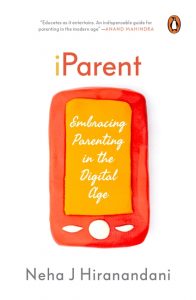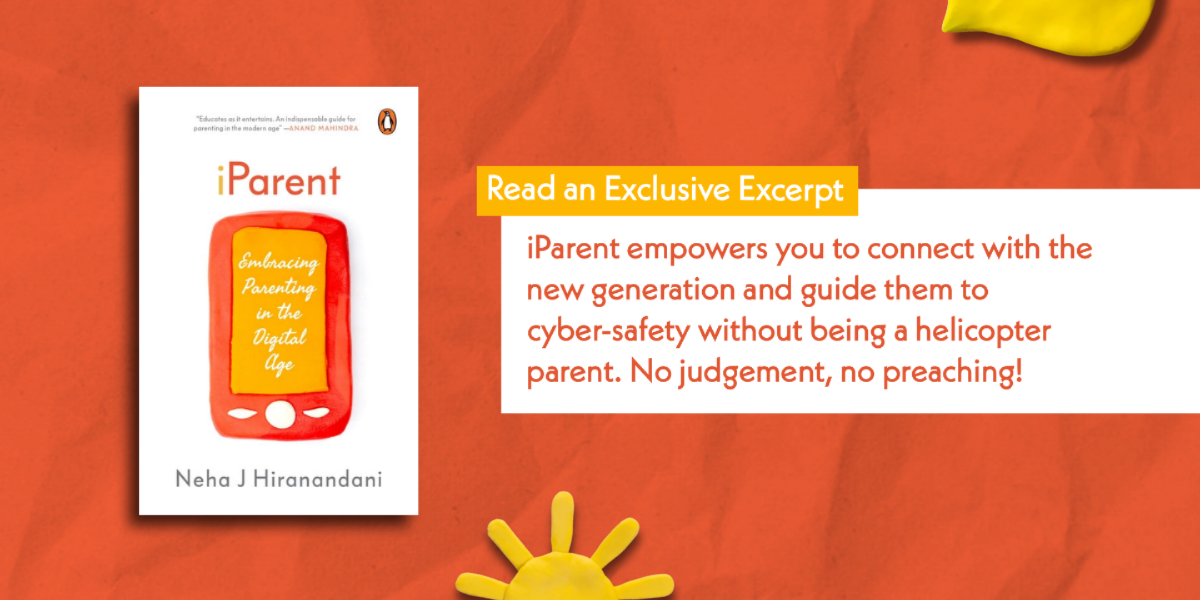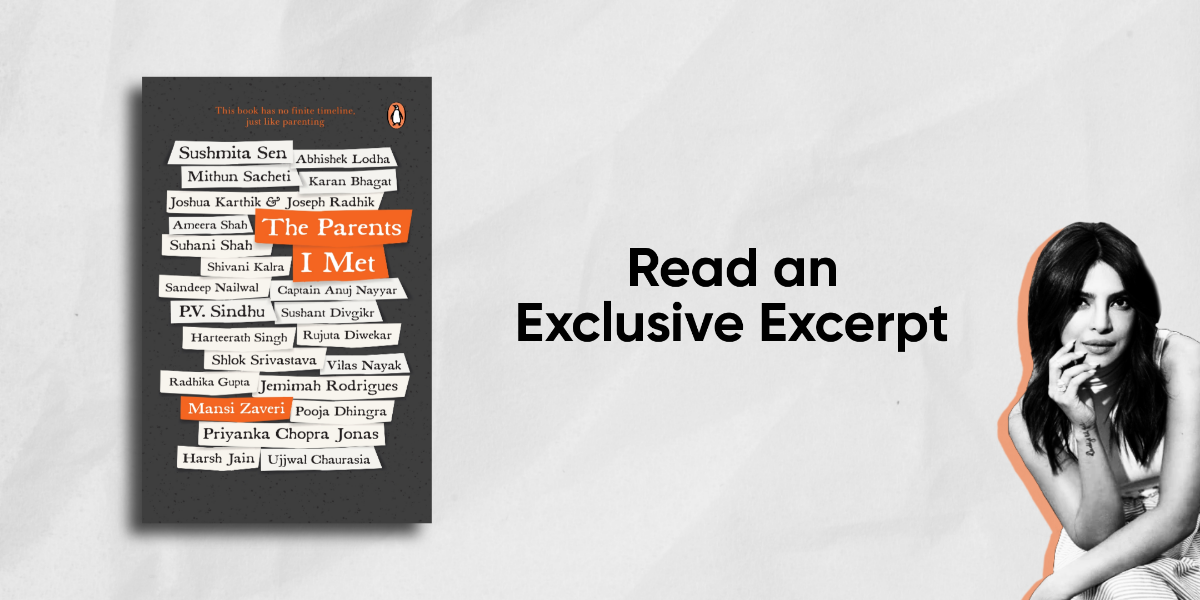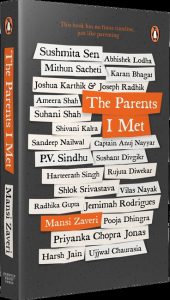Parenting in today’s digital age is undeniably challenging. With technology, the internet, and social media dominating our lives, it’s easy to feel overwhelmed by the constant stream of notifications and updates. So how do we guide our children through the digital world’s maze without a map? Neha J Hiranandani‘s iParent is a friendly companion for parents navigating the complexities of raising kids in a digital age. Packed with practical advice and a dash of humor, it’s the go-to resource for fostering cyber-savvy kids without the stress.
Read this exclusive excerpt to know more!

***
I remember reading about the Flynn effect in college. Buried neck-deep in books and classes, it was heartening to read that improved access to nutrition and better schools had made humans smarter in the twentieth century. Perfect grades seemed more achievable—after all, we had all become collectively smarter! That buoyancy, however, lasted just a few short decades. As things stand, the world is experiencing a reversal of the Flynn effect, and global IQ scores have dropped precipitously by six points. The truth is, we’re all turning a bit doltish. As one expert puts it, ‘People are getting dumber. That’s not a judgment; it’s a global fact.’
Most of us experience this doltishness every day. It’s getting harder to remember the names of colleagues, words stay permanently suspended on the tips of our tongues, and really, who can remember anyone’s birthday anymore? The Internet has fundamentally altered the way we process information, and as a result, we’re all struggling to focus. Every time we go online, our brains get subtly rewired. And since we are online so much, our brains are constantly adapting to accommodate the Internet’s deluge of small, shallow fragments of information.
Nicholas Carr, one of the most influential thinkers of our times, Is the author of The Shallows: What the Internet Is Doing to Our Brains, which went on to become a Pulitzer Prize finalist. ‘I’m not thinking the way I used to think,’ says Carr. The Internet, he says, ‘is chipping away [the] capacity for concentration and contemplation.’ Online activity, especially when we’re restlessly ping ponging from one activity to another makes us lose focus. Jumping from text to email, opening one tab and then quickly clicking on another, switching frantically back and forth between news and notifications—all of this destroys the calm brain and creates a new kind of mind, one that becomes comfortable processing information in quick, fragmented bursts. The faster, the better.
As Carr’s book title implies, over time our brains lose the ability to go deep. We start living in the shallows. ‘Once I was a scuba diver in the sea of words. Now, I zip along the surface like a guy on a jetski,’ he says. Admittedly, living life on a jetski sounds like great fun but you are likely to encounter a few problems. With all that wind in your hair, salt in your eyes and the world whizzing by, it’s difficult to make thoughtful decisions. It’s tough to stop and deeply appreciate beauty on a jetski or to meaningfully engage with an intractable problem. Given that our circuitry is so malleable, the more we stay online, the more we train our brains to be distracted. We can rapidly process snippets of information, but sustained attention becomes massively challenging. The longer we are on the jetski, the more challenging it is to get off it.
It’s not just Carr; scores of experts agree that the human brain simply wasn’t built for the endless game of ping-pong tantalizingly offered by our phones. The consequences seem especially disturbing for iGen which is growing up with easy and immediate access to information which ultimately has an effect on how the kids function, both emotionally and otherwise. Experts suggest that this generation will have ‘a thirst for instant gratification and quick fixes, a loss of patience and a lack of deep-thinking ability.’ Screenagers’ are not the only ones affected. Nine and ten-year-olds indulging in over two hours of screen time per day scored lower on thinking and language tests. Some kids saw a premature thinning of the cerebral cortex as they spent time on screens—their grey matter was disappearing.
Disappearing grey matter or not, it’s hard to stop! Regardless of which generation we belong to, none of us can stop pinging. Every notification, every distraction is a little dopamine nugget in disguise and it’s challenging to focus on something when you’re used to getting a reward hit every few seconds. Drunk on dopamine, we start liking the distractions. We seek them out. The more we seek them, the more we click and the more we click— bullseye!—the more accurately the algorithm can place irresistible links directly in our fields of vision. Think about the last time that you went to a shopping mall. You likely had a salesperson come up and ask you to try a product. It’s usually not a big deal because you’re likely to only encounter a couple of pushy salespeople per mall visit. But when you’re online, the push and pulls come at you from all directions!
‘Have you tried this new recipe?’ Potatoes, green onions and a touch of mustard.’
‘Are you looking to lose ten kilos in twenty days?’
‘Have you checked out the season’s hottest filter?’
‘Become a millionaire overnight. Join our mailing list for just Rs 199’
‘Join our community to always feel happy.’
‘Free shipping on this summer’s hottest perfume that will make you smell like Italian lemons.’
‘Are you bored? Lonely? Depressed?’ Here are fourteen essential oils that you need right now.’
‘Looking for love? There’s a big surprise waiting for you.’
‘Get discounted Diwali hampers when you order in March.’
The sales push doesn’t end because whether it’s essential oils or real estate, the algorithm knows what we want better than anyone else. So, we click on these irresistible links, breaking our attention, disrupting our concentration and creating an avalanche of lost focus, which in turn, overtaxes our brains. And wouldn’t you know it, an overtaxed brain finds distractions more distracting, and there it is: a self-perpetuating dependence loop. We click and lose focus, which makes us want to click all the more. Clickety-click we go all day, tappity tap we go all night, leaking data and losing focus all the while.
***
Get your copy of iParent by Neha J Hiranandani wherever books are sold.









